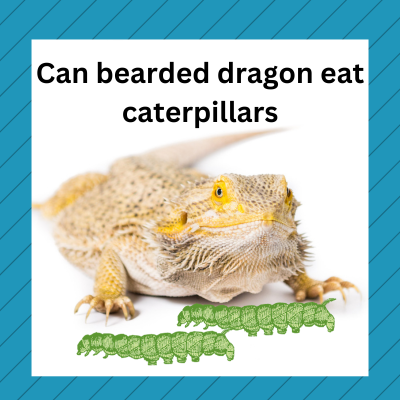Bearded dragons make fascinating and popular pets. Their unique appearance and docile nature make them a favorite among reptile enthusiasts. Responsible pet owners must provide our bearded dragons with a balanced and nutritious diet. One common question that arises is whether bearded dragons can eat caterpillars. In this post, we will explore the feeding habits of bearded dragons and shed light on whether caterpillars can be a part of their diet.
Can Bearded Dragons Eat Caterpillars?
Yes! Bearded dragons may find caterpillars to be a tasty snack. In the wild, they are known to feed on these soft-bodied insects as part of their natural diet. When it comes to domesticated bearded dragons, many owners like to incorporate caterpillars into their pet’s food regimen as an occasional treat.
Caterpillars offer many benefits to a bearded dragon’s diet. They are high in protein, calcium, and other essential vitamins and minerals that your pet needs for a balanced diet. In addition, they are low in fat and can be easily digested by these reptiles.
Before we dive into the details, let’s take a closer look at the nutritional value of caterpillars. Caterpillars are the larval stage of moths and butterflies and predominantly feed on plant matter. As a result, they can provide a good source of vitamins and minerals for bearded dragons. However, it’s essential to consider the potential benefits and risks of feeding caterpillars to bearded dragons.

Pros of eating caterpillars:
1. Eating caterpillars is an excellent source of protein for bearded dragons. Caterpillars provide them with the essential nutrients to help maintain their health and happiness.
2. Caterpillars are also full of healthy fats, which helps to keep your dragon’s scales supple and looking good.
3. Another great benefit of feeding your bearded dragon caterpillars is that they can add variety to their diet.
4. Eating caterpillars also helps with digestion, as a caterpillar’s exoskeleton helps break down food faster and more efficiently.
5. Feeding your dragon this type of prey allows them to practice their natural hunting instincts, which can benefit mental stimulation.
Cons of eating caterpillars:
1. Caterpillars may contain parasites that can enter bearded dragons, which could lead to serious health problems.
2. The nutritional content of caterpillars is not as beneficial as other insects, such as crickets and mealworms, for bearded dragon growth and health.
3. Caterpillars are usually more difficult for bearded dragons to digest and may cause indigestion and other digestive issues.
4. Some caterpillars are toxic or poisonous to beard dragons, so it is important to research the particular species you are considering feeding your pet.
5. Over-feeding caterpillars can lead to nutritional deficiencies as they do not contain a balanced diet of vitamins and minerals for bearded dragons.
Considerations for Feeding Caterpillars:
Types of Caterpillars to Avoid
Generally, it’s best to avoid feeding bearded dragons wild-caught caterpillars. This is because it can be challenging to identify the specific species of caterpillars and determine their safety for consumption. Some caterpillars can have toxic compounds in their bodies, which can be harmful or fatal to bearded dragons.
Preparing Caterpillars for Consumption
If you choose to feed caterpillars to your bearded dragon, it’s crucial to ensure they come from a reliable source. Look for suppliers who specialize in providing safe and nutritious feeder insects for reptiles. Additionally, you should properly gut-load and dust the caterpillars with calcium and multivitamin supplements to enhance their nutritional value.
Frequency and Portion Sizes
Feeding caterpillars should be done in moderation. They should not form the primary or sole source of nutrition for your bearded dragon. Instead, they can be offered as an occasional treat or supplement to their insects, vegetables, and greens diet. Maintaining a balanced and varied diet is important to ensure your pet’s overall health and well-being.
What kind of caterpillars can bearded dragons eat?
Bearded dragons can eat many caterpillars, including wax worms, mealworms, hornworms, tomato hornworms, and silkworms. Wax worms are the most commonly available for purchase in pet stores and make a great snack for bearded dragons.
Mealworms are also readily available in pet stores and provide essential nutrients to these lizards. Hornworms offer a nutritious snack with high-quality proteins and a crunchy texture. Tomato hornworms are also relatively large and provide an excellent source of vitamin C for bearded dragons.
Finally, silkworms contain essential minerals and vitamins that offer important dietary benefits to these reptiles.
Can bearded dragons eat black swallow caterpillars?
No, bearded dragons cannot eat black swallow caterpillars. While these caterpillars are commonly found in the wild, they should not be fed to your pet bearded dragon as they contain a toxin that can be harmful if ingested. As an alternative, many other insects and vegetables make great dietary options for your bearded dragon.
Conclusion:
In conclusion, if done in moderation and with the proper safety precautions, feeding your bearded dragon caterpillars can be a great way to give them an interesting and nutritious treat. Just remember always to do your research and never feed caterpillars that may be poisonous or that you are unsure about.
